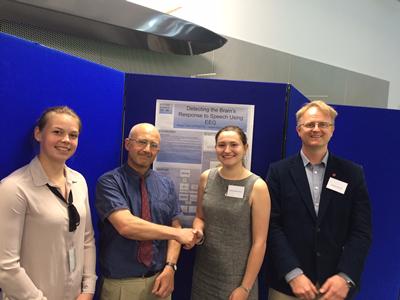Research to improve hearing aids wins biomedical engineering prize funded by GSK

Leading healthcare company GSK has funded a prize at the Engineering and the Environment Individual Project Conference, presented to third year Master of Acoustical Engineering student Robyn Hunt. She displayed a poster explaining her research to detect the brain’s response to speech by using an electroencephalogram (EEG) to record brain activity. The prize, worth £300, was judged and awarded by the event organisers Dr Stefan Bleeck and Professor Neil Bressloff.
“I was surprised and pleased to win this award,” she says. “I really enjoyed this project and learned a great deal about signal processing and analysis from it. In fact, it has encouraged me to consider specialising in this area of acoustics after I graduate.”
Robyn’s project is part of wider research at the University of Southampton, funded by the Engineering and Physical Sciences Research Council (EPSRC), to improve the efficiency of hearing aids by measuring the electronic response of the brain to audio stimuli. This is especially valuable for patients who cannot tell clinicians whether they can hear sounds, such as babies and people with dementia.
David Simpson, Professor of Biomedical Signal Processing, supervised Robyn’s project: “It is important to know whether the brain can respond to speech as well as the beeps and clicks usually used in hearing tests. Robyn did a very good job in analysing the data and calculating the delay between the arrival of speech in the brain and its response.”
Andrew Dundon, Head of Device Engineering at GSK, explains why the company wanted to get involved with the University: “Engineers play a crucial role at GSK. They help transform the scientific ideas generated in our R&D labs into reality, for example by designing the devices that will deliver our medicines to patients in the most effective way. We’re delighted to partner with the University of Southampton, a world leading academic institution in engineering, and congratulate Robyn on completing a thoughtful and innovative project.”
The prize-giving was attended by Dee Tress, who has been a member of GSK's R&D Future Leaders Programme since graduating from the University of Southampton in 2015 with a Masters in Mechanical Engineering - Biomedical Engineering. Also recruited to the Programme at the same time were two other Southampton graduates.
“It is important to know whether the brain can respond to speech as well as the beeps and clicks usually used in hearing tests. Robyn did a very good job in analysing the data and calculating the delay between the arrival of speech in the brain and its response.”
Robyn’s project is part of wider research at the University of Southampton, funded by the Engineering and Physical Sciences Research Council (EPSRC), to improve the efficiency of hearing aids by measuring the electronic response of the brain to audio stimuli. This is especially valuable for patients who cannot tell clinicians whether they can hear sounds, such as babies and people with dementia.
David Simpson, Professor of Biomedical Signal Processing, supervised Robyn’s project: “It is important to know whether the brain can respond to speech as well as the beeps and clicks usually used in hearing tests. Robyn did a very good job in analysing the data and calculating the delay between the arrival of speech in the brain and its response.”
Andrew Dundon, Head of Device Engineering at GSK, explains why the company wanted to get involved with the University: “Engineers play a crucial role at GSK. They help transform the scientific ideas generated in our R&D labs into reality, for example by designing the devices that will deliver our medicines to patients in the most effective way. We’re delighted to partner with the University of Southampton, a world leading academic institution in engineering, and congratulate Robyn on completing a thoughtful and innovative project.”
The prize-giving was attended by Dee Tress, who has been a member of GSK's R&D Future Leaders Programme since graduating from the University of Southampton in 2015 with a Masters in Mechanical Engineering - Biomedical Engineering. Also recruited to the Programme at the same time were two other Southampton graduates.